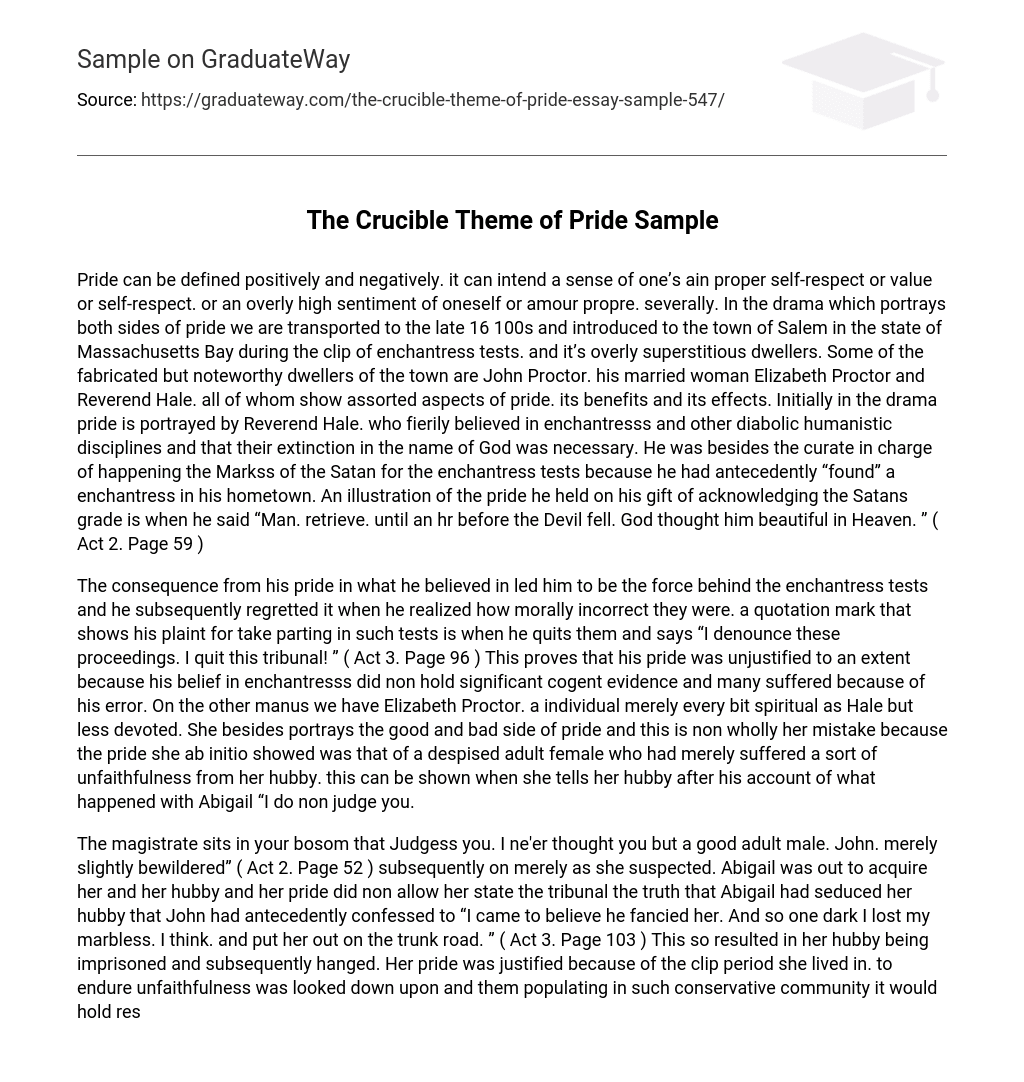Pride can be defined positively and negatively. it can intend a sense of one’s ain proper self-respect or value or self-respect. or an overly high sentiment of oneself or amour propre. severally. In the drama which portrays both sides of pride we are transported to the late 16 100s and introduced to the town of Salem in the state of Massachusetts Bay during the clip of enchantress tests. and it’s overly superstitious dwellers. Some of the fabricated but noteworthy dwellers of the town are John Proctor. his married woman Elizabeth Proctor and Reverend Hale. all of whom show assorted aspects of pride. its benefits and its effects. Initially in the drama pride is portrayed by Reverend Hale. who fierily believed in enchantresss and other diabolic humanistic disciplines and that their extinction in the name of God was necessary. He was besides the curate in charge of happening the Markss of the Satan for the enchantress tests because he had antecedently “found” a enchantress in his hometown. An illustration of the pride he held on his gift of acknowledging the Satans grade is when he said “Man. retrieve. until an hr before the Devil fell. God thought him beautiful in Heaven. ” ( Act 2. Page 59 )
The consequence from his pride in what he believed in led him to be the force behind the enchantress tests and he subsequently regretted it when he realized how morally incorrect they were. a quotation mark that shows his plaint for take parting in such tests is when he quits them and says “I denounce these proceedings. I quit this tribunal! ” ( Act 3. Page 96 ) This proves that his pride was unjustified to an extent because his belief in enchantresss did non hold significant cogent evidence and many suffered because of his error. On the other manus we have Elizabeth Proctor. a individual merely every bit spiritual as Hale but less devoted. She besides portrays the good and bad side of pride and this is non wholly her mistake because the pride she ab initio showed was that of a despised adult female who had merely suffered a sort of unfaithfulness from her hubby. this can be shown when she tells her hubby after his account of what happened with Abigail “I do non judge you.
The magistrate sits in your bosom that Judgess you. I ne’er thought you but a good adult male. John. merely slightly bewildered” ( Act 2. Page 52 ) subsequently on merely as she suspected. Abigail was out to acquire her and her hubby and her pride did non allow her state the tribunal the truth that Abigail had seduced her hubby that John had antecedently confessed to “I came to believe he fancied her. And so one dark I lost my marbless. I think. and put her out on the trunk road. ” ( Act 3. Page 103 ) This so resulted in her hubby being imprisoned and subsequently hanged. Her pride was justified because of the clip period she lived in. to endure unfaithfulness was looked down upon and them populating in such conservative community it would hold resulted in the calumny of her and her hubby and the clergymans niece.
However we have John Proctor. the chief representant of pride who is the tragic hero of the drama. He is a good spiritual adult male like his married woman but his fatal defect is his pride and lusting after Abigail Williams that subsequently leads the enchantress tests because of Proctor’s rejection and so lawfully causes his eventual decease sentence. His pride is shown when he does non desire to populate with the effects of his matter with Abigail “Spare me! You forget nothin’ and forgive nothin’ . Learn charity. adult female. I have gone tiptoe in this house all seven months since she is gone. I have non moved from at that place to there without I think to delight you. and still an ageless funeral Marches round your bosom. I can non talk but I am doubted. every minute judged for prevarications. as though I come into a tribunal when I come into this house! ” ( Act 2. Page 52 ) The consequences and his alteration of bosom sing his sense of self-respect is shown when he reluctantly admits his unfaithfulness “A adult male may believe God slumbers. but God sees everything. I know it now.
I beg you. sir. I beg you—see her for what she is. . . She thinks to dance with me on my wife’s grave! And good she might. for I thought of her softly. God aid me. I lusted. and there is a promise in such perspiration. But it is a whore’s retribution. ” ( Act 3. Page 100 ) His pride merely like his married woman was justified because of the clip period he lived in. his actions were frowned upon and he felt bad about them so acknowledging them was an act to be proud of alternatively of non acknowledging it because of his ain pride. In decision. John Proctor is the sternest of all three characters when it comes to plume and most decidedly the 1 that had to pay the most because of his fatal defect. His last act which was accepting the decease sentence alternatively of lying and acquiring to populate was what turned his character about and the complete antonym of inordinate pride. The determination between life and decease was his crucible. his topographic point or juncture of terrible trial or test and the determination of deceasing is what redeemed his character. what separated him from populating a suffering life filled with mistakes against deceasing as a sufferer that wanted justness.





